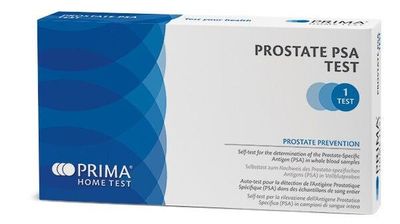
Prima Home Test Prostate PSA Testkit - 1 Test
Prima Home Test
$39.90
Prostate-PSA Test
WHAT IS THE PROSTATE-PSA TEST FOR?
The Prostate-PSA Test controls the level of PSA (Prostate Specific Antigen) in blood, in order to check a possible prostate alteration.
WHAT IS PSA?
The Prostate Specific Antigen (PSA) is a protein produced by the epithelial cells of the prostate gland and it is part of the male genital tract. Located inside the pelvic cavity, under the bladder, is a pyramidal shape fibro-muscular structure, with a base at the top. Its function is to fluidify the ejaculation and therefore increase the sperm mobility. PSA also plays an important role in dissolving cervical mucus, allowing sperm to enter the uterus. Small quantities of PSA are normally found in blood of men with a healthy prostate. Prostate pathologies (such as prostatitis, benign prostatic hyperplasia, cancer) lead to an increase in the blood levels of PSA. Its levels are also naturally increasing with age, after prostate surgery or specific diagnostic tests, for example: rectal examination, prostate biopsy, prostate ultrasound scan etc.
WHO DOES USE THE PROSTATE-PSA TEST?
The Prostate-PSA Test is intended for men aged over 45, who don't have symptom but wish to check their prostate; and also men with urinary tract symptoms like difficulty urinating, pain and increased frequency.
HOW DOES THE PROSTATE-PSA TEST WORK?
The Prostate-PSA Test is an immunochromatographic assay that, thanks to specific antibodies, is able to detect the level of PSA in the blood above 4 ng / ml, with a special monoclonal gold-conjugate antibodies embedded to the strip. Results in just 5 minutes.
WHEN SHOULD I DO THE PROSTATE-PSA TEST?
The Test is useful to perform a periodic prostate health status check, especially for men from 45 years of age, or in presence of urinary tract symptoms, such as: difficulty, pain and increased frequency of urination, in order to take any action necessary to maintain a good health status. An early diagnosis is fundamental and could save lives.
